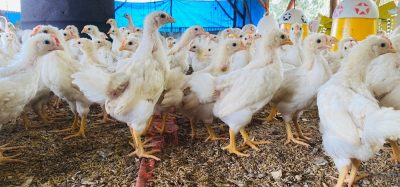Parliamentary group report warns UK food production could fall by a third by 2050
Posted: 3 November 2025 | Ben Cornwell | No comments yet
A cross-party report warns UK food production and food security are at risk unless urgent reforms protect farmland and boost productivity.


UK food production could slump by almost a third within 25 years unless urgent reforms are made to protect farmland and boost agricultural productivity, a new report has warned.
Without radical policy reform, the UK risks further erosion of its food self-sufficiency and growing reliance on imports at a time when geopolitical instability and climate extremes threaten global food supply chains.”
Launched today (3 November 2025) at the Agri-Science Summit in Westminster, the Feeding Britain sustainably to 2050 – the 30:50:50 mission report from the All-Party Parliamentary Group on Science and Technology in Agriculture (APPGSTA) warns that government targets for housing, energy, tree planting and infrastructure could see the loss of up to 25 percent of farmland, much of it prime arable land.
The study, led by former NFU chief economist Dr Derrick Wilkinson, projects that without policy change, domestic food output could decline by 32 percent by 2050, or 39 percent per capita. It urges ministers to elevate food security to the same strategic level as net zero and biodiversity, with a statutory goal of 75 percent self-sufficiency by mid-century.
The report brings together evidence and feedback from more than 100 organisations and individuals across the food and farming sector, gathered through wide-ranging engagement following the launch of the APPGSTA’s 30:50:50 mission earlier this year.
UK agriculture “at a tipping point”
APPGSTA chair George Freeman MP said UK agriculture was “at a tipping point”. He warned: “Despite favourable growing conditions, world-class agri-science, and a highly professional farming sector, UK agricultural productivity growth has stalled. Across successive governments, fragmented support policies, inconsistent regulation and a failure to translate scientific advances into practice have constrained progress.”
“Defra’s own research indicates that current farm policies will reduce or displace domestic food production,” Freeman added. “Without radical policy reform, the UK risks further erosion of its food self-sufficiency and growing reliance on imports at a time when geopolitical instability and climate extremes threaten global food supply chains.”
The report calls on the government to adopt the Group’s 30:50:50 mission, a national framework to increase farm output by 30 percent by 2050 while halving agriculture’s environmental footprint, as a consistent benchmark for all food and land policies.
Freeman said that while the government’s Food Strategy “rightly set out the goal of creating a healthier, more sustainable food system”, that ambition was “being undermined by competing priorities from other departments – particularly the growing push for industrial solar farms on agricultural land.” He added: “We simply cannot afford to lose prime farmland to meet renewable energy targets.”
Report’s key recommendations
Among the report’s recommendations are:
- embedding the 30:50:50 mission across all food, farming and land use policies
- protecting high-quality farmland from non-agricultural development
- establishing a National Farm Data Initiative to measure productivity and sustainability progress
- reforming farm support to reward measurable outcomes rather than practice uptake
It also calls for faster progress in regulating and adopting agri-tech innovations, including genetic and biotechnology advances and AI-enabled farm data systems, to help improve productivity and sustainability in UK agriculture.
The 30:50:50 framework has been widely endorsed by scientists, farmers and agri-tech organisations as a practical way to align productivity, sustainability and innovation. But the report says the current policy environment is “not fit for purpose”, citing inconsistent regulation, poor data integration, and weak translation of research into on-farm results.
It points to examples abroad, noting that the United States aims to increase farm output by 40 percent by 2050 under its Agricultural Innovation Agenda, while the European Union’s new Vision for Agriculture and Food places innovation at the centre of its food security strategy.
The report concludes that without joined-up leadership and clear direction, UK risks falling behind global competitors in sustainable food production.
Related topics
Environment, Food Security, Health & Nutrition, Regulation & Legislation, Supply chain, Sustainability, Technology & Innovation, Trade & Economy, World Food
Related organisations
ll-Party Parliamentary Group on Science and Technology in Agriculture (APPGSTA)









